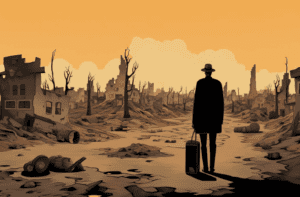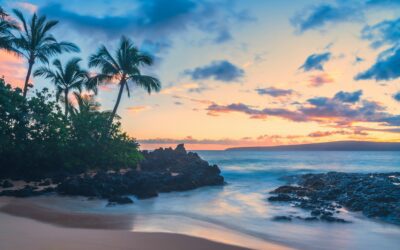If you have plans to return to Maui soon, you might want to reconsider.

©Christopher Elliott
Hawaii’s Governor Josh Green is “strongly discouraging” travel to West Maui in the wake of the island’s deadly wildfires, which completely destroyed the historic village of Lahaina. Hotels on that part of the island have temporarily stopped accepting bookings of travelers who want to return to Maui.
The tragic wildfires in Hawaii, the deadliest in modern US history, have also raised broader questions for travelers. When is it safe to return to Maui or any area hit by a natural disaster? And when does it make sense to book your next vacation there?
When should you return to Maui or anywhere after a natural disaster? What about Katrina in New Orleans?
This is hardly the first time travelers have asked if returning after a natural disaster was safe. It happened in 2005 after Hurricane Katrina. It also happened to Alabama’s Gulf Coast, where oil pellets peppered its postcard-perfect beaches after the Deepwater Horizon spill.
As it turns out, you can plan your next vacation sooner than you think and help a damaged destination without exploiting it.
“Katrina brought us to our knees,” remembers Sean Cummings, a New Orleans entrepreneur who owns the International House, a boutique hotel in the city’s central business district. “When the storm hit us, we knew we had to do more than just rebuild. We had to reinvent ourselves.”
For the Crescent City, part of that reinvention meant doubling its commitment to hospitality.
Howard Leventhal and his wife, Lois, visited from New Jersey in April 2006, just a few months after the disaster.
“We found the service to be welcoming, friendly and excellent at the hotels and restaurants that we visited,” recalls Leventhal, a retired math teacher. Tourists like the Leventhals benefited from lower prices, post-Katrina — and relished the opportunity to help a city on the mend.
Returning to Alabama’s Gulf Coast after the oil spill.
When the Gulf oil spill happened in 2010, Spectrum Capital, a commercial developer based in Jackson, Miss., had just completed a luxury condo on Alabama’s Gulf Coast. The project had already weathered an economic downturn, which delayed its completion. But the spill threatened to sink it.
Instead of throwing in the towel, as many other developers in the area did, Spectrum added luxury furnishings to some of its units and put them on the vacation-rental market. It also unveiled a “clean bed guarantee” that promised hotel-like amenities for its customers.
And it worked. Visitors returned, drawn by the favorable room rates and a promise of better hospitality.
“We feel like survivors,” says Spectrum president Jason Voyles.
Welcome back packages in Colorado after a natural disaster

Tourism officials quickly repaired the damage in response to that blaze and another wildfire in 2012. They launched an ambitious “welcome back” campaign to encourage people to visit the region and give the Royal Gorge Bridge & Park another chance after nearly the entire attraction was rebuilt.
“I think people feel more fulfilled with this type of vacation because they realize they are making a direct difference in a local hotel, property, restaurant or attraction,” says Colorado Springs Convention & Visitors Bureau spokeswoman Chelsy Offutt. “They feel a sense of pride and ownership when things start to rebuild or come back to life.”
A fine line between support and exploitation
Tourism officials say there’s a fine line between visiting a destination immediately after a tragedy — disaster tourism, and it’s not pretty — and going somewhere to support it. (Here’s my complete guide to planning a trip.)
But the rewards can be considerable, according to Vesna Plakanis, who runs a guide service in the Smoky Mountains called A Walk in the Woods. Wildfires ravaged the area last year, hurting their business and thousands of other vendors near the park.
“You not only benefit from the feel-good of economically supporting an area that a disaster has hard hit,” she says, “you also are likely to find great deals because hotels and other businesses offer discounts to attract travelers.”
Another bonus: Smaller crowds, a more intimate experience, even during high season. A return to Maui this winter may help.
Tragedy can also make a destination downright chatty. Almost without exception, the areas hit by disasters found a new voice in the aftermath. They spoke out on social media and via ad campaigns to inform everyone when returning was safe.
That’s even true for Miami-Dade County in Florida. After the Zika scare a few years ago led to a wave of cancellations, it found its voice.
Tourism officials, at first, didn’t want to talk about Zika. But they changed their tune as the number of cases multiplied. Miami launched a public-awareness campaign called “Fight the Bite” to inform prospective visitors about Zika. More than 70 hotels also signed a “Tourism Industry Mosquito Abatement Pledge” to combat mosquito-borne illnesses.
Your tourism dollars can make a difference after a natural disaster.
But perhaps the best reason to return is that your tourism dollars can make a difference. They did this for Estes Park, Colo. A 2013 flood there inundated the main roadways to Rocky Mountain National Park.
“We heard from so many visitors that they had traveled to Estes Park and Rocky Mountain National Park multiple times since they were children,” remembers Elizabeth Fogarty, president of Visit Estes Park. “And because of this connection, they felt an attachment and passion for the area.”
People returned because they loved the park and wanted to see it again. Travelers should return to Maui for the same reason.
That’s likely what will happen in Maui after the cleanup. Hawaii relies on tourism, so it will not waste time giving the green light to visit West Maui as soon as it’s practical. Expect hotel and tour discounts for travelers who return to a place that is not fully recovered from an unspeakable tragedy.
In the meantime, Hawaii tourism officials are telling visitors to stay away from West Maui until at least September. Depending on the recovery efforts, it might take a few more weeks before they’re ready for tourists again. (If you’re dealing with a cancellation and can’t get your money back, please feel free to contact the Elliott.com advocacy team. We’re always happy to help.)

READ ALSO:

Christopher Elliott is an author, consumer advocate, and journalist. He founded Elliott Advocacy, a nonprofit organization that helps solve consumer problems. He publishes Elliott Confidential, a travel newsletter, and the Elliott Report, a news site about customer service. If you need help with a consumer problem, you can reach him here or email him at [email protected].

